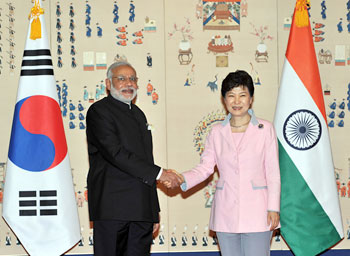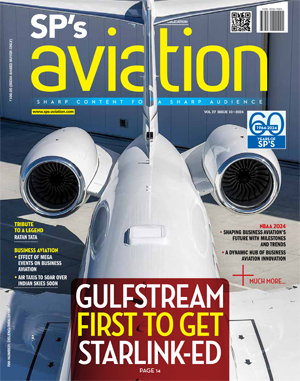INDIAN ARMED FORCES CHIEFS ON OUR RELENTLESS AND FOCUSED PUBLISHING EFFORTS

SP Guide Publications puts forth a well compiled articulation of issues, pursuits and accomplishments of the Indian Army, over the years

"Over the past 60 years, the growth of SP Guide Publications has mirrored the rising stature of Indian Navy. Its well-researched and informative magazines on Defence and Aerospace sector have served to shape an educated opinion of our military personnel, policy makers and the public alike. I wish SP's Publication team continued success, fair winds and following seas in all future endeavour!"

Since, its inception in 1964, SP Guide Publications has consistently demonstrated commitment to high-quality journalism in the aerospace and defence sectors, earning a well-deserved reputation as Asia's largest media house in this domain. I wish SP Guide Publications continued success in its pursuit of excellence.
- Indian Air Force Aims for Full Indigenous Inventory by 2047 — Air Chief Marshal A.P. Singh
- Rajnath Singh assumes charge as Defence Minister for the second consecutive term
- Interim Defence Budget 2024-25 — An Analysis
- Union Defence budget 2024
- Prime Minister Modi Flies in the LCA Tejas
- New Chapter in India-Italy Defence Ties
- Airpower beyond Boundaries
India South Korea - evolving defence relations




With India and South Korea raising the level of bilateral relations to ‘Special Strategic Partnership’, the two countries are poised to play a bigger role together in East Asian Affairs, giving a significant boost to India’s ‘Act East’ policy. From ‘Look East’ to ‘Act East’ marked an important turn in India’s engagement with South East Asian and East Asian countries, some of whom look towards India for diplomatic and security support.
The visit of the Prime Minister Narendra Modi on May 18 and 19 to Seoul marked a new turn in bilateral relations, with emphasis on strengthening defence and security relations through high level visits of defence and armed forces officials from both countries for giving concrete shape to the evolving security relations between the two nations. Though the principal agenda of Modi in his engagements with the South Korean President Park Geun-hye was to seek South Korean assistance in India’s economic modernization, Modi also emphasized on deepening defence cooperation.
After the talks with the South Korean President, Prime Minister Modi said, “We intend to deepen our cooperation in defence technology and manufacture of defence equipment in India. This sector offers huge opportunities in India. Both the countries will organize regular discussions between the national security councils. We have also agreed to expand cooperation between our armed forces.” Along with other sectors of Indian economy, Modi also invited the Korean defence industries to take advantage of India’s ‘Make In India’ policy in the defence sector, as India offers huge market for defence equipments in India. Modi said, “I have requested President Park to support the participation of Korean companies in the defence sector in India. Her response has been positive.”
The ground work for strengthening India-South Korea defence and security relations were laid during the April 19 visit of the Indian Defence Minister Manohar Parrikar to Seoul where he had extensive engagement with the top defence echelons of the country. These included Defence Minister Han Min Koo, National Security Advisor Kim Kwan-jin, Minister of Defence Acquisition Program Administration (DAPA) Chang, and Admiral Choi, Chairman of the Joint Chiefs of Staff. During the visit Parrikar had co-chaired the India-ROK defence ministerial meeting which identified ways and means to deepen engagement in the defence sector. During these high level discussions, both sides recognized that the relationship was one in which there are no obstacles to realizing the significant potential for military to military ties. Parrikar had then told the South Korean defence leaders that in recognition of the importance India attaches to Korea as a partner, he had chosen to make Republic Of Korea the first destination of his visit after the “Make in India” campaign began. Both sides agreed to enhance their efforts to develop mutually-beneficial partnerships in defence production.
Parrikar during his meeting with the National Security Advisor Kim had discussed ways of intensifying bilateral cooperation in security and defence and considered ways to enhance these ties in a manner more commensurate with close strategic partners.
These meetings had in fact cleared the way for Modi to invite the South Korean defence industries to take a look at India’s defence needs and how to be a partner in India’s defence modernization. South Korea is considered strong in defence electronics and warship manufacturing, with who the Indian private sector defence industries can develop partnership. With this aim the South Korean leaders agreed to establish a Joint Working Group on Shipbuilding with India.
During his mid April tour to South Korea, Parrikar had visited Korea’s ninth largest corporation, Hanwha, which is a Korean leader in ordnance, fuzes, precision guided systems, sensors and aerospace. After the visit and meeting with the President of Hanhwa Shim, Parrikar invited Hanwha to participate in the ‘Make In India’ programme, taking into account the enormous opportunities for mutually beneficial business opportunities, emerging in India. He had also interacted with the senior representatives of DAPA, Korean Defence Industries association and over 15 leading Korean defence industries. Senior management team of Indian defence firms including Goa Shipyards Ltd., Bharat Electronics Ltd., Mahindra Defence, L&T, and Tata Power SED had accompanied the Defence Minister to South Korea. In meetings with the top management of Hyundai Heavy Industries, Parrikar had invited them to become strategic partners for India’s defence and commercial shipping sectors.
The first memorandum of understanding on Defence logistics and supplies was signed in 2005 and in May 2007 Indian and South Korean defence ministers had organized their first ever consultations on matters of mutual interest and had then agreed to strengthen cooperation on training of armed forces personnel and strengthening of mutual cooperation between the coast guards of the two countries. The then Indian Defence Minister A K Antony had visited Seoul in 2010. In spite of regular exchange of high level defence delegations between the two countries since the last one decade the defence engagement between the two countries is limited to the Indian import of three Suknya class offshore patrol vessels which were supplied by Tacoma company in the early eighties. Presently, the South Korean defence industry is well positioned to meet many of India’s military requirements as the country has developed a robust arms industry and wants to emerge as a top ten defence supplier of the world.





